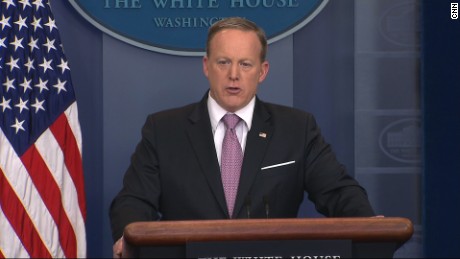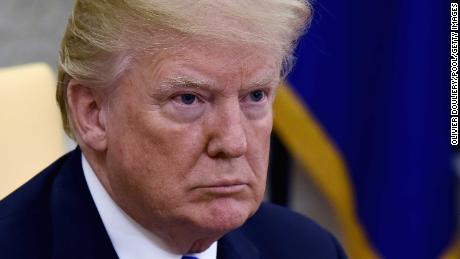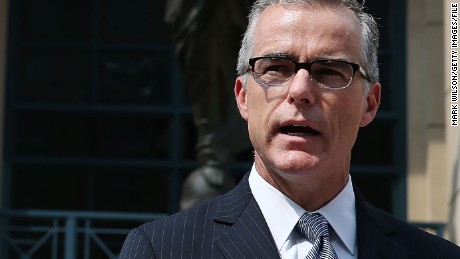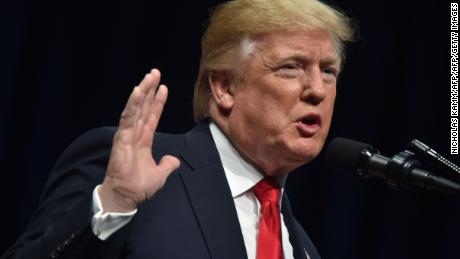Story highlights
- "This election is rigged" turned into a ready applause line for Trump at rallies
- Now, discussion of a "deep state" is creeping into the American mainstream
Washington (CNN)When Donald Trump was trailing in public opinion polls leading up to Election Day 2016, he had a ready answer for why he was losing -- the system was rigged against him. He didn't offer any proof, but "this election is rigged" turned into a ready applause line at rallies.
Then he won, in epic fashion. His populist message swept the Rust Belt out from under Democrats and suddenly the victim of purported rigging was headed to the White House.
When it became clear that he won the election, but lost the popular vote, Trump had a new reason -- fraud. Millions of people had fraudulently voted and stolen the popular vote victory from him and given it to Hillary Clinton, he suggested.
Again, no evidence was given, but Trump felt strongly enough to demand an investigation into the matter.
Now, people influential with the most powerful man in the world are publicly raising concerns that there is a cabal of entrenched bureaucrats hidden in the bowels of the nation's government who are intent on his political demise.
But the idea of a deep state, similar to the idea of a rigged election or a fraudulent vote count, could cause a more fundamental threat: Each presupposes the government is actually controlled by hidden hands that ignore the law without compunction. It assumes these government actors wantonly ignore the law. That's a potentially destabilizing and explosive idea. So is, however, the notion that Russians helped install the president. And that's something Democrats have taken to pushing even though there's no evidence that Russian meddling had any effect on the November results.
With all these swirling accusations in the ether, discussion of a "deep state" -- formerly the obsession of conspiracy theorists and scholars of Egyptian and Turkish politics and the subject of spy novels and TV shows like "Scandal" -- is creeping into the American mainstream.
Trump himself has not spoken publicly about the term. But he did accuse political holdovers of trying to undermine his presidency by leaking information about his campaign's communications with Russians.
"Russia is fake news. Russia -- this is fake news put out by the media," he said back in February during his only solo press conference since taking office. "The real news is the fact that people, probably from the Obama administration because they're there, because we have our new people going in place, right now."
White House Press Secretary Sean Spicer offered his take on the idea during Friday's White House press briefing.
"I think that there's no question when you have eight years of one party in office, there are people who stay in government and continue to espouse the agenda of the previous administration," Spicer said. "So I don't think it should come as any surprise there are people that burrowed into government during eight years of the last administration and may have believed in that agenda and may continue to seek it. I don't think that should come as a surprise."
Spicer dismissed the idea that the CIA is working to identify those people and remove them from government.
That would be against the law, by the way; the CIA is barred from conducting "internal security functions" inside the US.
But that didn't help squash the conspiracy theory this week following documents released by WikiLeaks suggesting the CIA knows how to tap into smart phones and TVs.
Of course, neither the CIA nor any other spy agency would be able to lawfully use those tools on an American citizen under the law without first getting a FISA warrant.
Neither would former President Barack Obama have been able to wiretap candidate Trump, as the President suggested recently without offering any evidence. At least not under the law. For starters, the President doesn't conduct investigations. Second, his government would need a warrant to monitor conversations between Americans. There's some gray area when it comes to communications with foreign nationals.
The FBI has a "super secret division (in) charge of the Russia investigation," according to CNN's headline Friday. But within that story, it points out there were more agents detailed to the investigation of Hillary Clinton's email server, according to one source.
Trump opponents, it should be noted, have been no less paranoid about what the new president will do, and have taken a number of actions to protect data on climate change, for example, gathered by the federal government.
But none of this has stopped the idea of a "deep state" from taking hold.
A Republican congressman, Rep. Michael Kelly, said during an appearance in his Pennsylvania district that Obama had stayed in Washington to "run a shadow government," according to video published on Axios.
According to CNN's most recent reporting, the former President is perturbed by Trump's wiretapping allegations, but he's trying hard to bite his tongue -- save for a statement from his spokesman -- and give the new administration room.
















